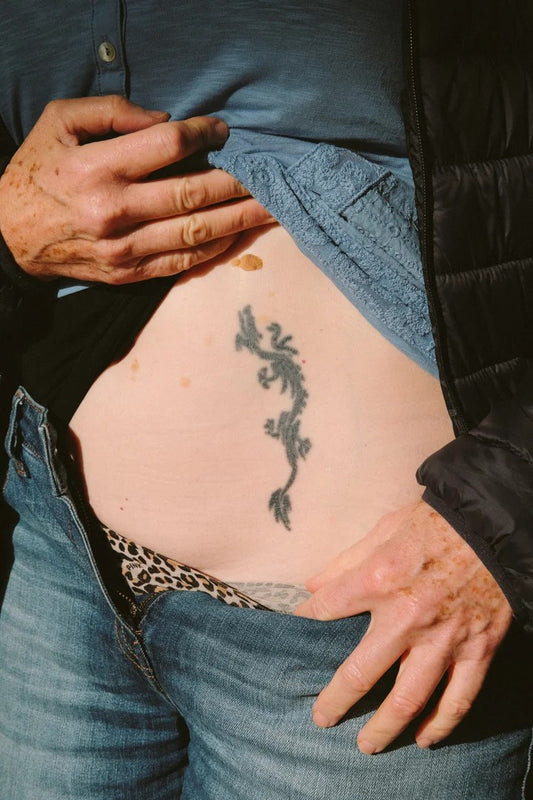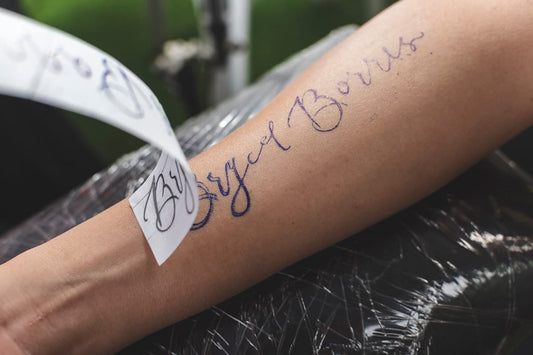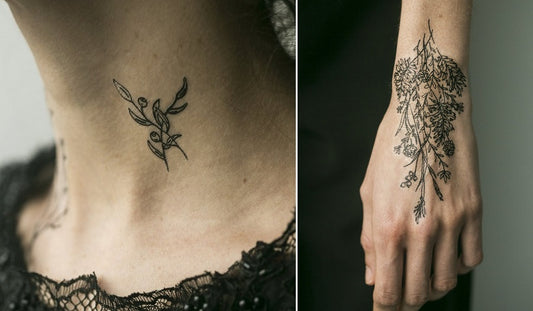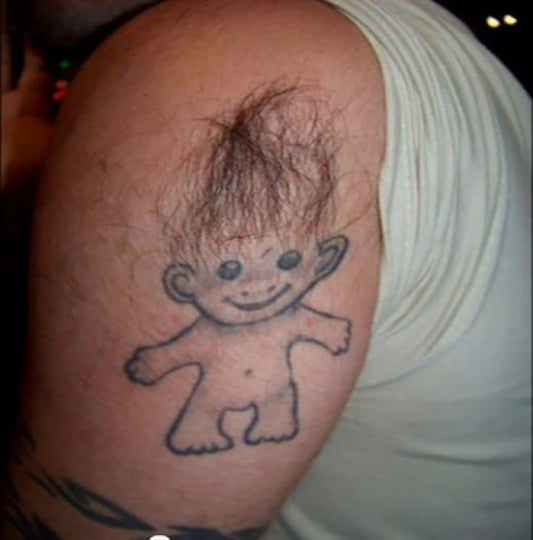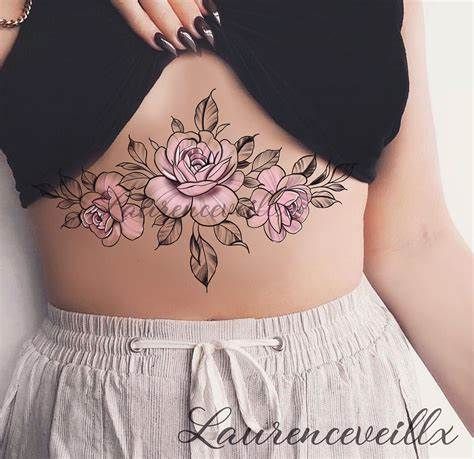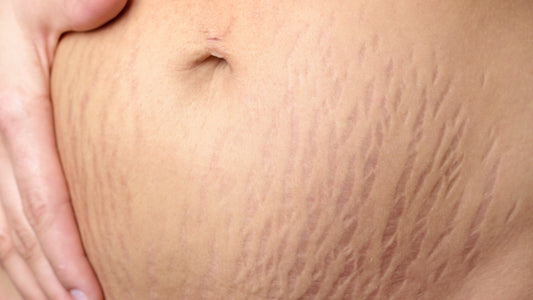
What is Tattoo Bruising and How Do You Manage It?
After all, you're getting permanent body art that will last you a lifetime when you get a tattoo. The potential negative experiences people may encounter during or after getting a tattoo are often overlooked or ignored by those who talk about tattoos. One needs proper information, advice, and help to unpack tattoo care and deal with adverse effects so that the conclusion to such an exciting new thing can remain so in the future.
Today we're going to talk about tattoo bruising. It's not one of those tattoo-related things you see all the time. If you're experiencing tattoo bruising, it's not an outright lie to say it's normal. If you're reading this, chances are you're suffering from bruising around your tattoo.
As a result, Tattoo bruising can occur as a normal response of the skin to the trauma caused by the tattoo machine during the tattooing process. we want to reassure you that it is normal and nothing to worry about. Here are some reasons why this happens so you can feel better about it. Without further ado, let's discuss tattoo bruising, what causes it, and how to treat it!
1. Is It Normal for My New Tattoo to Be Bruised?
After a tattoo, the area around the new ink goes through many changes and processes as the surrounding skin tries to heal itself. Tattoo bruising is one of many processes that can occur during these bodily changes. Bruising around a tattoo can be cause for concern for those who didn't expect it to happen, but don't worry, these bruises usually cause nothing else serious.
Before discussing tattoo bruising, it is important to understand how tattooing affects your skin and body. Thanks to the tattoo gun, tattoo needles puncture your skin thousands of times per minute. A tattoo can create trauma on the skin, or be more specific, an open wound, depending on where it is placed.
It can be messy at first, especially in the first few days, with all the bleeding and oozing. The body deals with the ink in the immediate aftermath of a tattoo, trying to get it out of its system as a foreign object, and healing the wound to prevent infections. It can also leave some unwanted side effects, like bruises around the tattoo, on your body.
Bruising related to tattoos isn't uncommon in some cases. When you are poked with the tattoo needle, your skin takes in the puncture impact, which causes it to bleed. Blood clotting eventually stops the bleeding, but the impact of the initial puncture and trauma remains. Consequently, people experience pain and discomfort in the area for a few days after surgery. Bruising is also experienced by some people.
Why Do Some People Experience Tattoo Bruising?
The skin will begin to close up once the tattoo stops bleeding. Scabs and dried blood usually result from this. The tattooed skin is undergoing a healing process and skin regeneration beneath the surface. Despite the fact that the tattoo is no longer bleeding outward, blood still leaks beneath the surface of the skin, forming little pools of blood. As a result, the greater the blood volume, the greater the pools, and the blood is absorbed back into the body. Bruising is the result of blood being absorbed back into the body after a few days.
A bruise that appears around a tattoo generally looks like a regular bruise. As time passes, their colors change from yellow to brown to blue to black.
2. Tattoo Bruises and Its Causes
Despite tattoo bruising being a rather rare occurrence, certain factors can definitely cause it. The above-mentioned explanation regarding blood being absorbed back into the body is one of the main causes of tattoo bruising. However, some factors may increase the risk of bruising by causing blood to absorb, so let's explore them all.
- Tattoo location - certain body parts bruise more easily than others. It is common for bruises to appear out of nowhere on the lower extremities, such as the thighs and legs. Gravity causes blood to pool in the legs, feet, and ankles (blood disperses downward instead of upward).
- Thin skin areas – areas where the skin is super thin tend to bruise easily compared to thick skin areas. Because thin skin has less or no cushioning (flash or fat layers), it is very delicate.
- Medication – if you’re taking medication that can cause blood thinning, you’re more likely to experience tattoo bruising. Aspirin and Ibuprofen, over-the-counter medications that thin blood, can cause increased bleeding during and after tattooing. Medications that prevent blood clotting will result in more blood being reabsorbed into the body, which will increase the chance of bruising.
- Tattoo artist’s technique – if you’re having your tattoo done by someone who is inexperienced and lacks proper tattooing skills, you’re more likely to experience all the adverse effects of tattooing, including bruising. The inexperienced tattoo artist either applies too much pressure to the skin (pushes the needle too deep, causing swelling and bruising), or presses too hard, damaging the blood vessels.
- You bruise easily – it's important to acknowledge that some people, especially women, bruise easily. You may bruise more easily if you are taking blood-thinning medication, using anti-inflammatory drugs, suffering from a bleeding disorder, or lacking vitamins C and K.

3. Tattoo bruising: What Should I Do?
A tattoo bruise will go away on its own after a few days, just like any other bruise. Due to the fact that we are talking about bruising around an open wound, it is important to treat it carefully. The following tips can help you.
- Elevation - blood pools tend to appear when blood disperses downward rather than upward. Therefore, when getting a tattoo, try elevating the area where it will be placed to reduce bruising. During sleep, you can use pillows to assist you.
- Ice compression - you can only use this once the tattoo has stopped bleeding and oozing, and is essentially drying out and closing. Ice compression should only be applied to bruises, not tattoos, otherwise, you may risk infection. The use of ice reduces bruising and speeds up the healing process.
- Avoid alcohol and smoking – alcohol is a known blood thinner and smoking prevents healing. By avoiding both of these, you can help your tattoo heal normally and prevent bruising.
- Take care of your diet - avoid processed foods, sugar, alcohol, and smoking, and drink plenty of water and vitamin C. Your diet can help your body heal your tattoo more quickly.
4. Conclusion
Some people experience tattoo bruising, although it's not common. It is generally nothing to worry about, but if the bruising is accompanied by any tattoo infection symptoms (pain, swelling, oozing, pus, fever), then you should seek medical attention. In addition to this, you can follow our recommendations regarding bruise treatment and carry on with your normal tattoo aftercare routine. It may take a few days or a few weeks for the bruising to subside, depending on the location and size of the tattoo.





